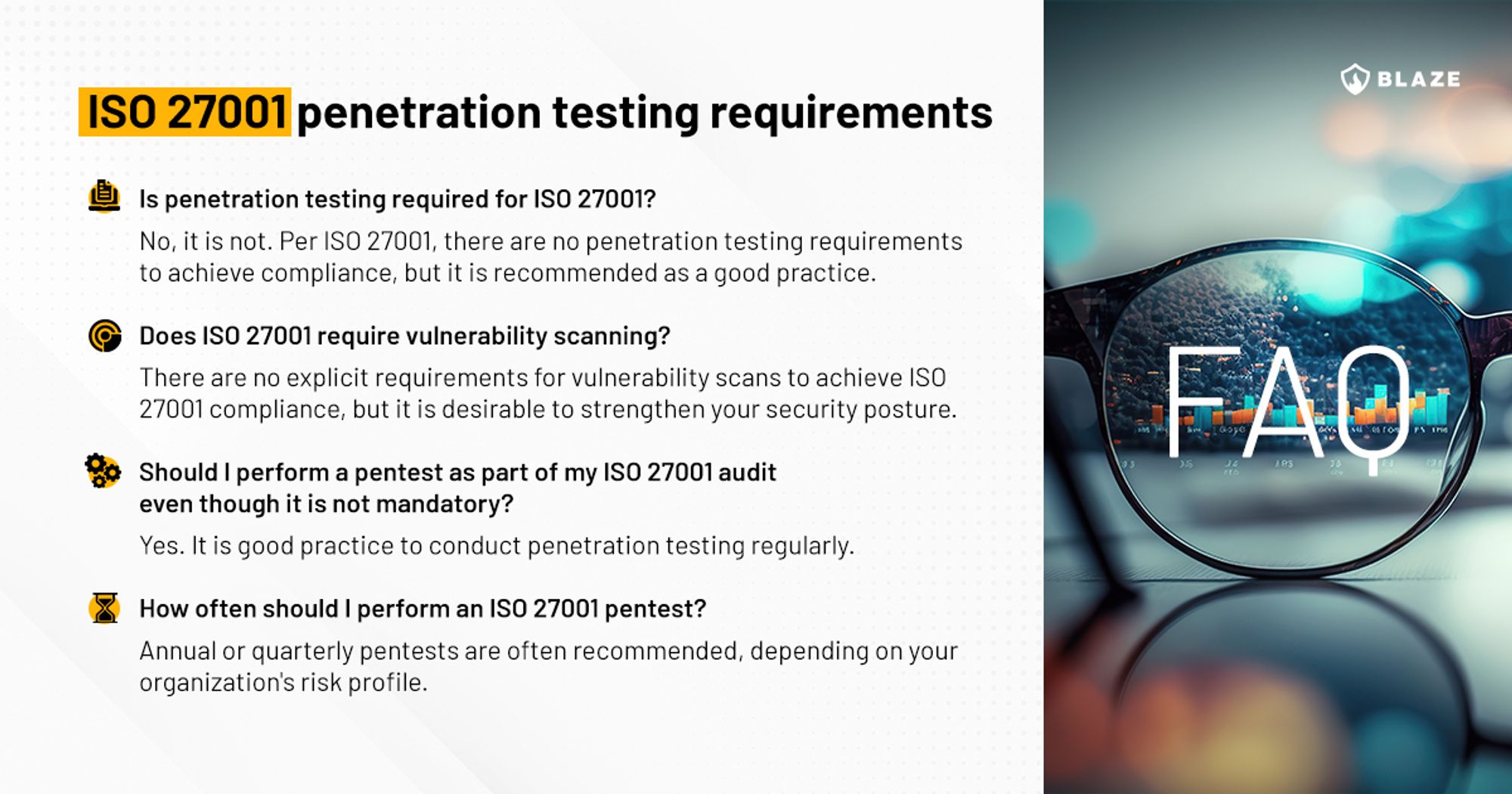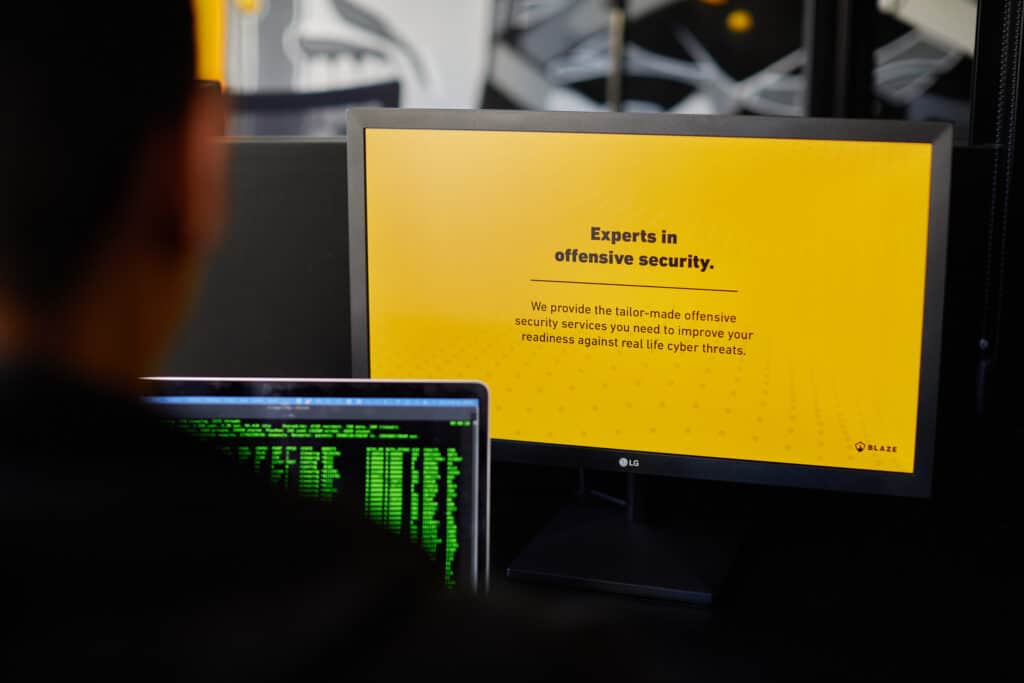All you need to know about ISO 27001 penetration testing requirements and comply with the latest ISO/IEC 27000:2022 standard.
This article will continue to be updated with new requirements for 2024, should they come into force.
Attaining ISO 27001 compliance is a critical milestone for organizations, as it validates their information security management system (ISMS) is up to par with the standard’s requirements. As part of the compliance process, organizations must undergo a thorough audit, where an impartial third-party assessor evaluates the ISMS against the established criteria.
During the assessment, the auditor scrutinizes the organization’s policies, procedures, and controls, as well as its risk evaluation and risk mitigation strategies, ensuring they align with the standard’s prerequisites. Should the auditor verify that the organization’s ISMS adheres to the specified requirements, the organization receives a certificate denoting compliance with the norm. This certification formally acknowledges that the organization has implemented robust and efficient information security systems.
In 2022, the ISO/IEC 27000 received an update, the first since 2013, yet questions regarding technical cybersecurity assessments persist.
In this post, we will explore what ISO says about requirements for penetration testing and vulnerability scanning in the context of ISO/IEC 27001:2022. This article aims to help your organization decide whether these assessments are necessary for your ISO 27001 compliance goals and if they can help strengthen your cyber defenses.
What is ISO 27001 compliance, and why is it important?
ISO/IEC 27001 is among the most widely recognized information security standards. This standard presents a comprehensive framework for an organization’s information security management system (ISMS), offering guidelines and requirements to establish, implement, maintain, and continually enhance information security.
The foundation of ISO 27001 lies in a risk management methodology, assisting organizations in identifying, assessing, and prioritizing risks to their sensitive data while implementing controls to minimize these risks to an acceptable level. The standard delineates the requirements for an ISMS, encompassing the policies, procedures, and controls an organization must establish to safeguard its sensitive information.
Is penetration testing a requirement for ISO 27001 in 2023?
No, penetration testing is not explicitly required for ISO 27001 compliance, even after the ISO/IEC 27001:2002 update. Nonetheless, it is recommended that organizations incorporate penetration testing into their ongoing risk assessment, internal audit, and risk management procedures.
Annex A of ISO 27001 refers to A.12.6.1 Management of technical vulnerabilities and A.14.2.8 System security testing, which outlines the following:
- A.12.6.1 Management of technical vulnerabilities:
Information about technical vulnerabilities of information systems being used shall be obtained promptly, the organization’s exposure to such vulnerabilities evaluated and appropriate measures taken to address the associated risk.
- A.14.2.8 System security testing:
Testing of security functionality shall be carried out during development.
ISO 27001:2022 merged A.14.2.8 and A.14.2.9 into a new control, A.8.29 Security testing in development and acceptance.
A security assessment containing a penetration test tailored for ISO 27001 addresses both A.12.6.1 and A.8.29. A penetration testing exercise is well-placed to identify vulnerabilities, helping to showcase compliance with technical vulnerability management, as detailed in Annex A.
ISO 27001 penetration testing detects security vulnerabilities and exhibits the practical probability of different attack scenarios. Consequently, penetration testing grants organizations an additional layer of confidence in properly implementing information security controls within their infrastructure while also helping as evidence of compliance when necessary and strengthening existing information security standards and practices.
Does ISO 27001 require vulnerability scanning?
ISO 27001 does not explicitly mandate vulnerability scanning for compliance. Similar to penetration testing, this type of security evaluation is not a strict requirement.
Nevertheless, just like penetration testing, a security scan and vulnerability assessments can be used to augment your audit and serve as evidence to satisfy the control A.12.6.1.
Should I perform penetration testing and vulnerability scanning as part of my ISO 27001 audit?
Perhaps. Several tangible advantages arise from incorporating penetration testing and vulnerability scanning to bolster ISO 27001 audit compliance objectives and enhance your cyber resilience:
- Uncovering security vulnerabilities and cyber risks: Penetration testing is crucial in helping organizations identify security weaknesses in their systems and networks, which malicious hackers could exploit. This enables organizations to prioritize rectifying these vulnerabilities, improving their security posture and minimizing cyber threats.
- Safeguarding against cyber-attacks and data breaches: A professional penetration test empowers organizations to anticipate real-world adversaries by identifying vulnerabilities and addressing risks before threat actors exploit them.
- Demonstrating compliance: Regularly performing penetration testing and vulnerability scanning brings organizations closer to fulfilling the ISO 27001 standard requirements and satisfies the criteria for AICPA’s SOC 2 and other compliance requirements such as PCI DSS and HIPAA.
- Assessing the efficacy of security controls: Conducting technical security evaluations enables organizations to gauge the effectiveness of their security controls in detecting and thwarting attacks. This process aids organizations in pinpointing gaps in their security measures and identifying weak points in their defenses.
- Improving security awareness: Pen testing can also serve as a learning opportunity for organizations, helping to improve security awareness and understanding among employees and other stakeholders.
What is the frequency of ISO 27001 penetration testing?
Generally, it is recommended to perform ISO 27001 penetration testing at least once a year or following significant changes to the organization’s infrastructure or applications if you want to go beyond compliance needs.
The frequency of ISO 27001 penetration testing depends on various factors, including the organization’s size, industry, risk profile, and regulatory requirements.
Regular penetration testing is essential to maintaining a robust security posture, as it helps organizations identify new vulnerabilities, assess the effectiveness of their security controls, and keep pace with the evolving threat landscape, where a simple pentest for compliance may not be sufficient to uncover all risks to your organization.
Additionally, staying up-to-date with the latest cybersecurity practices and adapting your pentesting schedule accordingly can ensure your organization complies with ISO 27001 and other relevant standards.
ISO 27001 penetration testing requirements – infographic

How can we help your organization achieve ISO 27001 compliance?
Blaze is committed to helping clients achieve compliance through comprehensive ISO 27001 penetration testing services – our expertise in pentesting aligns perfectly with ISO 27001 technical security requirements, providing an additional layer of assurance for your organization’s information security program.
While we are not a compliance or audit firm, we collaborate with the world’s leading automated compliance platforms to support our clients throughout their ISO 27001 journey.
By choosing Blaze as your trusted partner, you can confidently navigate the complex landscape of information security and ISO 27001, ensuring that your organization meets the highest data protection and compliance standards.
Final remarks
ISO 27001 is a valuable asset for businesses aiming to enhance their information security processes, protect client data, and demonstrate a robust information security management system with solid controls.
Although penetration testing and vulnerability scanning are beneficial in detecting security weaknesses and revealing related risks to information systems, they are not mandatory for ISO 27001 compliance audit purposes. Deciding whether to conduct a penetration test or a vulnerability assessment during your ISO 27001 audit should be based on your organization’s unique risk profile and security goals.
However, providing an auditor with a comprehensive penetration test report (detailing technical vulnerabilities, respective mitigation measures, and compensating controls), along with proof of quarterly vulnerability scans, can undoubtedly bolster confidence in your organization’s cybersecurity practices and security posture, getting you one step closer to ISO 27001 compliance.
If your organization requires a reliable partner to meet your ISO 27001 penetration testing requirements, vulnerability analysis and other security assessments, contact our team today.
FAQ
Is penetration testing required for ISO 27001?
No, it is not. Per ISO 27001, there are no penetration testing requirements to achieve compliance, but it is recommended as a good practice.
Does ISO 27001 require vulnerability scanning?
There are no explicit requirements for vulnerability scans to achieve ISO 27001 compliance, but it is desirable to strengthen your security posture.
Should I perform a pentest as part of my ISO 27001 audit despite not being mandatory?
Yes. It is good practice to conduct penetration testing regularly.
How often should I perform an ISO 27001 pentest?
Annual or quarterly pentests are often recommended, depending on your organization’s risk profile.









